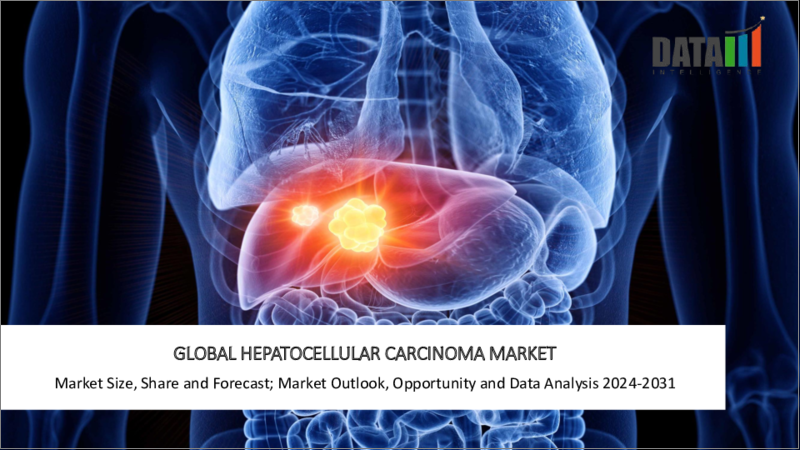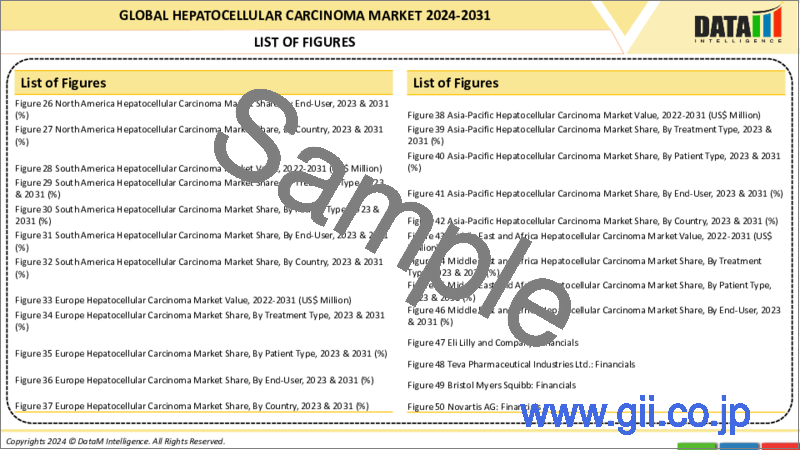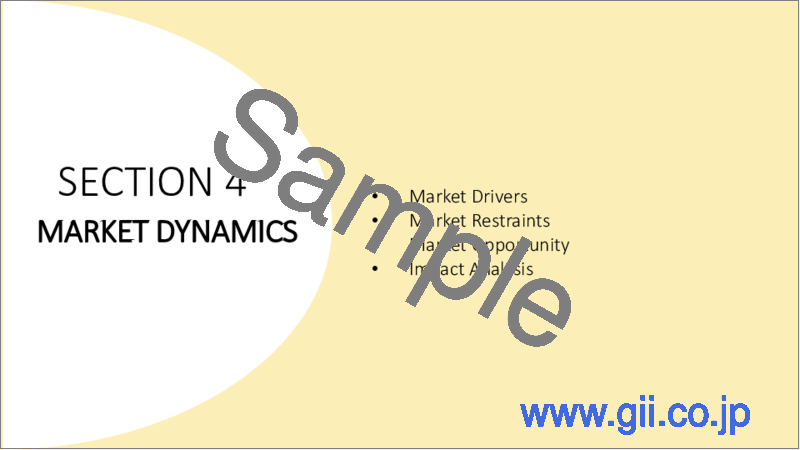|
|
市場調査レポート
商品コード
1297811
肝細胞がんの世界市場-2023年~2030年Global Hepatocellular Carcinoma Market - 2023-2030 |
||||||
カスタマイズ可能
適宜更新あり
|
|||||||
| 肝細胞がんの世界市場-2023年~2030年 |
|
出版日: 2023年06月15日
発行: DataM Intelligence
ページ情報: 英文 195 Pages
納期: 即日から翌営業日
|
- 全表示
- 概要
- 目次
市場概要
世界の肝細胞がん市場は、2022年に9億7,700万米ドルに達し、2030年には24億米ドルに達し、予測期間2023-2030年にCAGR 12.2%で成長すると予測されています。肝細胞がんの市場動向は、臨床試験の勃興と研究開発の増加により、肝細胞がんの大規模なパイプラインを示しています。
肝内胆管の肝細胞がん(HCC)市場は、肝細胞がんの市場シェアを高めています。例えば、米国がん学会は、2022年末までに原発性肝がんまたは肝内胆管がんがおよそ41,260人の新規診断例とおよそ30,520人の死亡例を占めるだろうと予測しています。
肝細胞がんの世界市場は、肝細胞がんの早期適切な診断への取り組みの増加、治療パイプラインの規模拡大、研究開発の高さなどの要因により拡大しています。2022年8月17日、ブリストル・マイヤーズスクイブはターニングポイント・セラピューティクスを買収し、プレシジョン・オンコロジー・ポートフォリオを拡大しました。
市場力学
肝細胞がんの早期診断に向けた取り組みの高まりが、肝細胞がん市場の成長を牽引しています
現在、肝細胞がんの診断に最適な方法を決定するための臨床試験がいくつか実施されています。これには、肝硬変患者を対象とした造影超音波(CEUS)およびガドキセチン酸強調肝MRIの診断能を評価する研究や、肝細胞がんおよび肝移植レシピエントの検出を目的とした多相造影MRIとCTの多施設前向き比較研究などが含まれます。
NGS/バイオマーカー、分子イメージング、リキッドバイオプシー、人工知能のような新しい診断技術はまだ初期段階であるため、研究者は患者ケアに導入するためのコスト、一般化可能性、応用ロジスティクスをさらに明確にしなければならないです。これは、適切な遺伝子、標的、技術の特定に加えて行われます。各戦略の利点と制約を互いに比較し、ベストプラクティスを特定するには、多施設前向き研究が必要です。
技術の進歩と臨床試験の増加により、メーカーに有利な機会が生まれる
様々な調査や臨床試験が、主要な主要企業によって共同またはパートナーシップのもとで実施されており、良好な結果を示しています。例えば、2022年1月18日、抗PD-1薬KEYTRUDAと最善の支持療法(BSC)が第3相KEYNOTE-394試験で調査されました。この試験は、アジアでソラフェニブ治療を受けたことのある進行型肝細胞がん(HCC)患者を対象に実施されました。
進行肝細胞がんの治療歴のある患者において、KEYTRUDAとBSCの併用療法は、プラセボとBSCの併用療法と比較して死亡リスクを21%減少させました。このOSの改善は統計学的に注目すべきものであり、臨床的にも意義のあるものでした。メルクは、3,000人以上の患者を登録した、または登録が見込まれる7つの臨床試験からなる世界の前進プログラムにより、肝細胞がんの研究促進に取り組んでいます。
診断法の欠如と治療の副作用が市場成長の妨げになる
しかし、肝細胞がんの世界マーケットは、適切な治療法がないことや治療に伴うさまざまな副作用のために、予測期間中は制約を受ける可能性があります。肝がんの症状や徴候は進行するまで現れないことが多いため、早期発見が困難な場合があります。右胸郭は肝臓の大部分を覆っているため、健康診断で小さな肝腫瘍を見つけるのは難しいです。
標的治療の中には、がんが新しい血管を増やすのを防ぐものがあります。また、腫瘍の増殖を促進する特定のがん細胞のタンパク質を狙う治療法もあります。疲労、発疹、食欲減退、下痢、痛み、出血、手足の灼熱感、腸や胃に穴が開くなどの副作用が考えられます。
COVID-19影響分析
COVID-19分析では、価格ダイナミクス、需給スペクトラム、政府の取り組み、メーカーの戦略的取り組みに加えて、COVID前シナリオ、COVIDシナリオ、COVID後シナリオを考慮します。これらの要因によって、取引制限、ロックダウン、後遺症の問題により需給が変動する可能性があります。
ロシア・ウクライナ紛争の影響分析
ロシアとウクライナの紛争は、この地域の主要市場プレーヤーの数が少ないことから、世界の肝細胞がん市場への影響は低いと推定されます。しかし、原材料の輸出入の影響は、予測期間中、肝細胞がんの世界市場の成長にほとんど影響を与えないと予想されます。
目次
第1章 調査手法と調査範囲
第2章 定義と概要
第3章 エグゼクティブサマリー
第4章 市場力学
- 影響要因
- 促進要因
- 肝細胞がんの早期診断に向けた取り組みの高まり
- 新製品の上市と臨床試験の増加
- 抑制要因
- 診断方法の欠如と治療の副作用
- 機会
- 高齢者人口の増加とがんの有病率の増加
- 影響分析
- 促進要因
第5章 産業分析
- ポーターのファイブフォース分析
- サプライチェーン分析
- 価格分析
- 規制分析
第6章 COVID-19分析
第7章 治療タイプ別
- 化学療法
- ブラキセラピー
- 局所アブレーション療法
- 手術療法
- その他
第8章 エンドユーザー別
- 病院
- 専門クリニック
- 外来手術センター
- その他
第9章 地域別
- 北米
- 米国
- カナダ
- メキシコ
- 欧州
- ドイツ
- 英国
- フランス
- イタリア
- スペイン
- その他欧州
- 南米
- ブラジル
- アルゼンチン
- その他南米
- アジア太平洋
- 中国
- インド
- 日本
- オーストラリア
- その他アジア太平洋地域
- 中東・アフリカ
第10章 競合情勢
- 競合シナリオ
- 市況/シェア分析
- M&A分析
第11章 企業プロファイル
- Eli Lilly and Company
- 会社概要
- 製品ポートフォリオと説明
- 財務概要
- 主な発展
- Teva Pharmaceutical Industries Ltd.
- Bristol Myers Squibb
- Novartis AG
- Bayer AG
- Merck & Co. Inc.
- F. Hoffmann-La Roche Ltd
- Polaris Pharmaceuticals Inc.
- Creative Diagnostics
- Harbour BioMed
第12章 付録
Market Overview
The Global Hepatocellular Carcinoma Market reached US$ 977 million in 2022 and is expected to reach US$ 2.4 billion by 2030 and grow with a CAGR of 12.2% during the forecast period 2023-2030. The hepatocellular carcinoma market trends show a large pipeline for hepatocellular carcinoma owing to the rising clinical trials and increasing research and development.
The hepatocellular carcinoma (HCC) market of intrahepatic bile duct has increased the market share for hepatocellular carcinoma. For instance, the American Cancer Society predicted that by the end of 2022, primary liver or intrahepatic bile duct cancer would account for roughly 41,260 new diagnosis cases and around 30,520 fatalities.
The global market for hepatocellular carcinoma is expanding due to factors including the increasing efforts for early and proper diagnosis of HCC, the growing size of the therapeutic pipeline, and high research and development. On August 17, 2022, Bristol Myers Squibb acquired Turning Point Therapeutics, expanding its precision oncology portfolio.
Market Dynamics
Growing Efforts for Early Diagnosis of HCC drive the growth of the Hepatocellular Carcinoma market.
A few clinical trials are currently being conducted to determine the best method for diagnosing hepatocellular carcinomas. These include studies to assess the diagnostic performance of contrast-enhanced ultrasound (CEUS) and gadoxetic acid-enhanced liver MRI among individuals with liver cirrhosis, as well as a multicenter, prospective comparison research of multiphase contrast-enhanced MRI and CT for the detection of hepatocellular carcinoma and liver transplant recipients.
Researchers must further define cost, generalizability, or application logistics for implementation in patient care because newer diagnostic techniques like NGS/biomarkers, molecular imaging, liquid biopsy, and artificial intelligence remain in their early stages. This is in addition to identifying appropriate genes, targets, or techniques. To identify the advantages and restrictions of each strategy when compared to one another and best practice, multi-center prospective studies are required.
Rising Technological Advancements and Clinical Trials creates lucrative opportunities for manufacturers
Various research and clinical trials are being conducted by the major key players in collaboration or partnership, showing positive outcomes. For instance, on January 18, 2022, the anti-PD-1 drug KEYTRUDA and best supportive care (BSC) were investigated in Phase 3 KEYNOTE-394 trial, which was conducted in patients with advanced forms of hepatocellular carcinoma (HCC) who had previously received sorafenib treatment in Asia.
For people previously treated for advanced HCC, KEYTRUDA plus BSC reduced the risk of mortality by 21% compared to placebo plus BSC. This improvement in OS was statistically noteworthy and clinically meaningful. With a worldwide advancement program of seven clinical studies that have included or are anticipated to enroll over 3,000 patients, Merck is committed to furthering research in HCC.
The Lack of Diagnosis Methods and Treatment Side Effects will Hamper the Growth of the Market.
However, the global marketplace for hepatocellular carcinoma may be constrained over the projected period due to the unavailability of proper treatment and various side effects associated with treatment. Because symptoms and signs of liver cancer frequently do not manifest until it is advanced, it can be challenging to detect it early. Because the right rib cage covers most of the liver, small liver tumors can be difficult to find during a physical examination.
Some targeted treatments prevent cancers from growing new blood vessels. Others go after specific cancer cell proteins that promote tumor growth. Fatigue, rash, decreased appetite, diarrhea, soreness, bleeding, scorching of the hands or feet, and holes in the intestine and stomach are only possible side effects.
COVID-19 Impact Analysis
The COVID-19 Analysis considers the Pre-COVID Scenario, COVID Scenario, and Post-COVID Scenario in addition to Pricing Dynamics, Demand-Supply Spectrum, Government Initiatives, and Manufacturers' Strategic Initiatives. These factors could cause supply and demand to shift due to trading restrictions, lockdowns, and after-effects issues.
Russia-Ukraine War Impact Analysis
The Russia-Ukraine conflict is estimated to have a low impact on the global hepatocellular carcinoma market, owing to the low number of key market players in this region. However, the effect of the import and export of raw materials is expected to have little influence over the global hepatocellular carcinoma market growth over the forecast period.
Segment Analysis
The Global Hepatocellular Carcinoma Market is segmented based on treatment type, end user and region.
Owing to Adoption, the Chemotherapy Segment Accounted for Approximately 36.7% of the Hepatocellular Carcinoma Market Share
The chemotherapy segment led the market for hepatocellular carcinoma, and this trend is expected to continue over the projected period 2023-2030. According to clinicaltrials.gov, 18 studies are ongoing and anticipated to be finished during the forecast period.
A few examples include a Phase 3 study sponsored by Sun Yat-sen University to assess the safety and efficacy of Sorafenib in combination with hepatic arterial infusion chemotherapy in comparison with the transarterial chemoembolization combined with Sorafenib in patients having BCLC C stage hepatocellular carcinoma.
A study on the safety and effectiveness of the treatment, Tislelizumab in combination with hyperthermic intraperitoneal chemotherapy and targeted therapy, which is utilized for hepatocellular carcinoma with high-risk, after R0 resection sponsored by the Hunan Provincial People's Hospital and is estimated to be completed by July 2025.
Geographical Analysis
North America Accounted for Approximately 37.2% of the Market Share, Owing to the Strong Presence of Major Players And Increasing Technological Advancements.
Manufacturers have chances to expand their operations in this region because of the rising demand for hepatocellular carcinoma for advancements in North America. The area has many producers and suppliers, and its rapid economic development has raised the industrial production of carcinoma therapeutics, increasing demand.
North America has a large number of producers and suppliers, and as a result of the swift economic development of the area, fueling the demand of hepatocellular carcinoma diagnostics and treatment.
Rising new product launches for use in patients with carcinoma will drive market growth. Growth is also fueled by increasing technological advancements, regulatory approvals and novel product launches. Researchers are becoming more aware of various treatment approaches for hepatocellular carcinomas, such as biomarkers, leading to the market expansion in this region. These factors show the dominance of North America.
Competitive Landscape
The major global players in the hepatocellular carcinoma market include: Teva Pharmaceutical Industries Ltd., Novartis AG, Bristol Myers Squibb, Bayer AG, Polaris Pharmaceuticals Inc., F. Hoffmann-La Roche Ltd, Harbour BioMed, Creative Diagnostics and Merck & Co. Inc. among others.
Why Purchase the Report?
- To visualize the Global Hepatocellular Carcinoma Market segmentation based on treatment type, end user and region, and understand key commercial assets and players.
- Identify commercial opportunities by analyzing trends and co-development.
- Excel data sheet with numerous hepatocellular carcinoma market-level data points with all segments.
- PDF report consists of a comprehensive analysis after exhaustive qualitative interviews and an in-depth study.
- Product mapping available as Excel consisting of key products of all the major players.
The Global Hepatocellular Carcinoma Market Report Would Provide Approximately 53 Tables, 54 Figures And 195 pages.
Target Audience 2023
- Manufacturers/ Buyers
- Industry Investors/Investment Bankers
- Research Professionals
- Emerging Companies
Table of Contents
1. Methodology and Scope
- 1.1. Research Methodology
- 1.2. Research Objective and Scope of the Report
2. Definition and Overview
3. Executive Summary
- 3.1. Snippet by Treatment Type
- 3.2. Snippet by End User
- 3.3. Snippet by Region
4. Dynamics
- 4.1. Impacting Factors
- 4.1.1. Drivers
- 4.1.1.1. Growing Efforts for Early Diagnosis of HCC
- 4.1.1.2. Rising Novel Product Launch and Clinical Trials
- 4.1.2. Restraints
- 4.1.2.1. The Lack of Diagnosis Methods and Treatment Side Effects
- 4.1.3. Opportunity
- 4.1.3.1. Rising Geriatric Population and Growing Prevalence of Carcinoma
- 4.1.4. Impact Analysis
- 4.1.1. Drivers
5. Industry Analysis
- 5.1. Porter's Five Force Analysis
- 5.2. Supply Chain Analysis
- 5.3. Pricing Analysis
- 5.4. Regulatory Analysis
6. COVID-19 Analysis
- 6.1. Analysis of COVID-19
- 6.1.1. Scenario Before COVID
- 6.1.2. Scenario During COVID
- 6.1.3. Scenario Post COVID
- 6.2. Pricing Dynamics Amid COVID-19
- 6.3. Demand-Supply Spectrum
- 6.4. Government Initiatives Related to the Market During Pandemic
- 6.5. Manufacturers Strategic Initiatives
- 6.6. Conclusion
7. By Treatment Type
- 7.1. Introduction
- 7.1.1. Market Size Analysis and Y-o-Y Growth Analysis (%), By Treatment Type
- 7.1.2. Market Attractiveness Index, By Treatment Type
- 7.2. Chemotherapy *
- 7.2.1. Introduction
- 7.2.2. Market Size Analysis and Y-o-Y Growth Analysis (%)
- 7.3. Brachytherapy
- 7.4. Local Ablation Therapy
- 7.5. Surgery
- 7.6. Others
8. By End User
- 8.1. Introduction
- 8.1.1. Market Size Analysis and Y-o-Y Growth Analysis (%), By End User
- 8.1.2. Market Attractiveness Index, By End User
- 8.2. Hospitals *
- 8.2.1. Introduction
- 8.2.2. Market Size Analysis and Y-o-Y Growth Analysis (%)
- 8.3. Specialty Clinics
- 8.4. Ambulatory Surgical Centers
- 8.5. Others
9. By Region
- 9.1. Introduction
- 9.1.1. Market Size Analysis and Y-o-Y Growth Analysis (%), By Region
- 9.1.2. Market Attractiveness Index, By Region
- 9.2. North America
- 9.2.1. Introduction
- 9.2.2. Key Region-Specific Dynamics
- 9.2.3. Market Size Analysis and Y-o-Y Growth Analysis (%), By Treatment Type
- 9.2.4. Market Size Analysis and Y-o-Y Growth Analysis (%), By End User
- 9.2.5. Market Size Analysis and Y-o-Y Growth Analysis (%), By Country
- 9.2.5.1. The U.S.
- 9.2.5.2. Canada
- 9.2.5.3. Mexico
- 9.3. Europe
- 9.3.1. Introduction
- 9.3.2. Key Region-Specific Dynamics
- 9.3.3. Market Size Analysis and Y-o-Y Growth Analysis (%), By Treatment Type
- 9.3.4. Market Size Analysis and Y-o-Y Growth Analysis (%), By End User
- 9.3.5. Market Size Analysis and Y-o-Y Growth Analysis (%), By Country
- 9.3.5.1. Germany
- 9.3.5.2. The U.K.
- 9.3.5.3. France
- 9.3.5.4. Italy
- 9.3.5.5. Spain
- 9.3.5.6. Rest of Europe
- 9.4. South America
- 9.4.1. Introduction
- 9.4.2. Key Region-Specific Dynamics
- 9.4.3. Market Size Analysis and Y-o-Y Growth Analysis (%), By Treatment Type
- 9.4.4. Market Size Analysis and Y-o-Y Growth Analysis (%), By End User
- 9.4.5. Market Size Analysis and Y-o-Y Growth Analysis (%), By Country
- 9.4.5.1. Brazil
- 9.4.5.2. Argentina
- 9.4.5.3. Rest of South America
- 9.5. Asia-Pacific
- 9.5.1. Introduction
- 9.5.2. Key Region-Specific Dynamics
- 9.5.3. Market Size Analysis and Y-o-Y Growth Analysis (%), By Treatment Type
- 9.5.4. Market Size Analysis and Y-o-Y Growth Analysis (%), By End User
- 9.5.5. Market Size Analysis and Y-o-Y Growth Analysis (%), By Country
- 9.5.5.1. China
- 9.5.5.2. India
- 9.5.5.3. Japan
- 9.5.5.4. Australia
- 9.5.5.5. Rest of Asia-Pacific
- 9.6. Middle East and Africa
- 9.6.1. Introduction
- 9.6.2. Key Region-Specific Dynamics
- 9.6.3. Market Size Analysis and Y-o-Y Growth Analysis (%), By Treatment Type
- 9.6.4. Market Size Analysis and Y-o-Y Growth Analysis (%), By End User
10. Competitive Landscape
- 10.1. Competitive Scenario
- 10.2. Market Positioning/Share Analysis
- 10.3. Mergers and Acquisitions Analysis
11. Company Profiles
- 11.1. Eli Lilly and Company *
- 11.1.1. Company Overview
- 11.1.2. Product Portfolio and Description
- 11.1.3. Financial Overview
- 11.1.4. Key Developments
- 11.2. Teva Pharmaceutical Industries Ltd.
- 11.3. Bristol Myers Squibb
- 11.4. Novartis AG
- 11.5. Bayer AG
- 11.6. Merck & Co. Inc.
- 11.7. F. Hoffmann-La Roche Ltd
- 11.8. Polaris Pharmaceuticals Inc.
- 11.9. Creative Diagnostics
- 11.10. Harbour BioMed
LIST NOT EXHAUSTIVE
12. Appendix
- 12.1. About Us and Services
- 12.2. Contact Us





